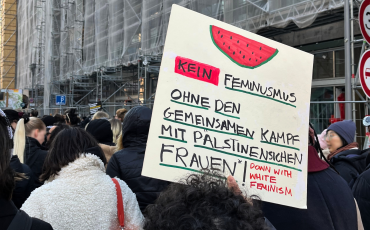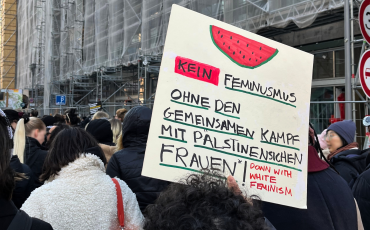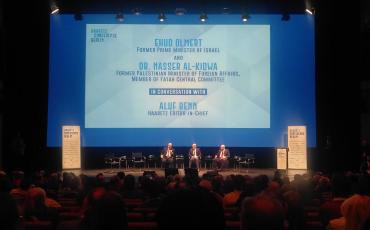External incentives are an important asset in supporting processes of conflict resolution and have also been an instrument in the Israeli-Palestinian conflict. In fact, the international and regional community have brought forward two relatively new incentive schemes that hold a potential to influence Israeli public’s views.
In December 2013, the European Council offered both parties – Israel as well as the Palestinian Authority – an unprecedented status of “special privileged partnership” with the EU if they could reach a peace agreement between them. From the EU perspective, the unique promise of this offer is that an Israeli-Palestinian peace would position Israel (as well as Palestine) in a unique status of an “almost member” in the EU, and allow it to enjoy a whole new level of economic, scientific and diplomatic cooperation. Nevertheless, the EU offer for an upgrade failed to achieve much impact on the Israeli government and public alike.
A public opinion survey conducted by Mitvim showed that only 16 per cent of the respondents had even heard about the offer, let alone allowed their views to be influenced by its content. Lacking basic promotion effort within the Israeli public and media, this incentive seemed to pass directly above the Israelis’ head. Moreover, even the few Israelis that had heard about it, were hardly impressed. The bureaucratic language in which it was articulated and, most importantly, the lack of specificity regarding tangible mechanisms and time-plans made it difficult for most Israelis to understand how this offer could improve the already close relations Israel enjoys with the EU. The failure to achieve any meaningful effect seems to also have discouraged EU policy makers from further developing it. Despite the Council’s decision to re-introduce the offer in 2016, in practice, it was rarely mentioned by EU officials during the last year.
The Arab Peace Initiative – victim of the regional dynamic
A different, yet hardly more successful incentive is the Arab Peace Initiative. In 2002, in the midst of the Second Intifada, the Arab League endorsed a plan for a comprehensive peace agreement between Israel and the Palestinians based on the concept of Israel’s future integration into the region. The plan offers Israel a full normalization of relations with the Arab world in return for a full Israeli withdrawal from all the Arab territories occupied in 1967, an establishment of an independent Palestinian State with East Jerusalem as its capital, and a “just” and “agreed upon” solution to the Palestinian refugee problem.
Seemingly this plan fulfils one of Israel’s long-lasting desires – its integration into the region as a legitimate member. The initiative was first presented as an “all-or-nothing” offer. In recent years, regional actors such as Saudi Arabia, Egypt and the UAE, have adopted a more flexible approach by offering specific aspects of normalization in return for Israeli constructive steps. Nevertheless, the initiative became a victim of the escalatory dynamic of the Israeli-Palestinian conflict right from its initial launch. It was declared in one of the worst nadirs of the second intifada (a day after the Passover Park Hotel terror attack), hardly the optimal public atmosphere to discuss prospects of long-term peace.
“Villa in the jungle” instead of “Hummus in Damascus”
The events of the “Arab Spring” further undermined the initiative’s effectiveness. The instability and political decline of some of its main sponsors in the Arab world shook the Israeli trust in Arab leaders’ future ability to deliver on their normalization commitments. Moreover, considering the chaos unfolding in their surroundings, the dream of full cultural and political normalization with the Arab world lost much of its appeal in Israeli public perception.
Instead of the 1990s visions of “eating Hummus in Damascus”, many Israelis prefer today to see Israel as a part of Europe. In this mindset that perceives Israel as a ”villa in the jungle”, full integration into the region is no longer seen as a token that justifies hard compromises. Nevertheless, normalization with the Arab world still appears in public surveys as the single most effective incentive in changing Israeli views regarding the peace process. Yet, the focus is on diplomatic and security relations rather than on cultural cooperation.
What can Europeans do to turn these incentives into an effective mechanism to increase the Israeli public’s support of the peace process? A lesson from the EU offer for an upgrade is, on a technical level, that these strategic incentives need to be refocused towards their most-relevant “client”, the Israeli public. However, marketing optimization is only a small part of the necessary change. On the content level, for international incentives to work, a new type of commitment is required from those offering them. Instead of separate incentive packages there is a need for a combined approach which could outline a practical vision for the “day after” the resolution of the conflict.
Try one package instead of two
A feasible option would be to combine the European and the regional incentive packages into one integrated package. Such a package would address both, Israel’s international position and its regional standing in a future reality of Israeli-Palestinian peace. Both offers would thus complement each other. Separately, the EU offer is positively affiliated with the high integrity of the EU as an international actor, but lacks an added value in Israeli public perception. On the other hand, in Israeli public perception the Arab Peace Initiative provides an added value but lacks the necessary integrity.
Therefore, a combined package would more likely be perceived by the Israeli public as both meaningful and reliable and serve as an effective incentive for winning hearts and minds for peace. In fact, a recent survey conducted in Israel shows the impact that such a combined package could have: 57 per cent of the respondents indicated that such a package (when coupled with US security guarantees) would increase their support for the peace process. While this would not lead to overcoming the current political and structural obstacles for conflict resolution, it would help prepare public opinion for the day when a credible peace process resumes. It would also contribute to gradually transforming the Israeli and Palestinian public into a support base for conflict resolution and thus increase the leaders’ win-set of compromise in future negotiations.
Dr. Gil Murciano is a Research Associate in the project »Israel and its regional and global conflicts: Domestic developments, security issues and foreign affairs« at Stiftung Wissenschaft und Politik (SWP), the German Institute for International and Security Affairs. He is also a Guest Lecturer specializing on Middle-Eastern international politics at the Hertie School of Governance in Berlin.



















